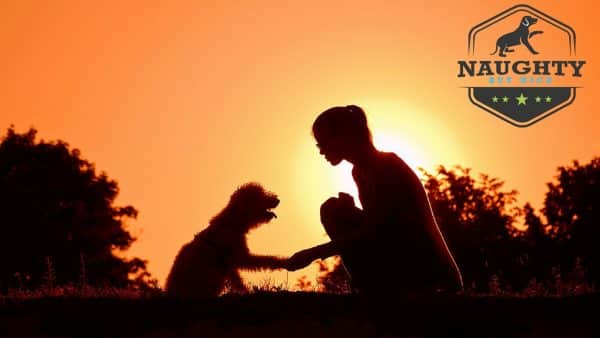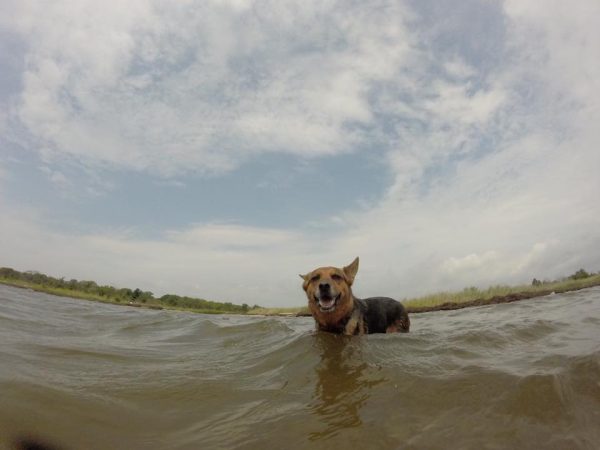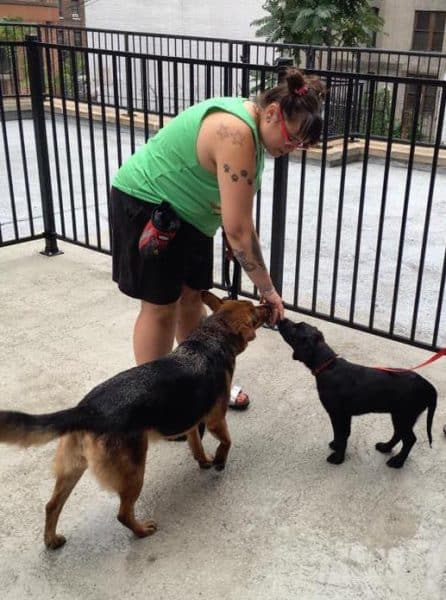My goal with any dog I bring into our family is to give that dog the best, most enriching life possible. I’ve written a lot about living with and training my reactive rescue, Charlotte. As a result, I was offered the opportunity to check out Absolute Dog’s Summer of Transformation course, and I jumped at the invitation! The online classes were an intensive course for what they call “naughty but nice” dogs — such a great way to refer to reactive pups, don’t you think?

Naughty but nice… I like that. (Photo via absolute-dogs.com)
Over the last 20 years, I have taken countless dog training classes, from basic obedience to high-level sport skills, but never online. I’ll admit I was skeptical as to whether eight weeks of online learning could have an impact on Charlotte. In many ways, she is the same dog now as she was at the beginning of the course, but she also has grown in some surprising ways. The course was one of, if not the most, engaging I’ve ever taken because it gave me a whole new way to view my relationship with her!
The program itself was almost like being back in college — we had pre-course reading, daily homework assignments, video lessons, and weekly lectures on topics such as arousal, the aftermath of reactivity, focus, and reliability.
And I really liked that it was taught by two trainers: Tom Mitchell, who is also a veterinary behaviorist, and Lauren Langman, also a high-ranked dog agility competitor. Their styles blended well and enabled me to feel connected to classes even though they were originating in England.
The core premise of the course was to use three-minute games to build a reactive dog’s focus and optimism. Over the years, I’ve read just about every dog training book I could get my hands, and I don’t think I’ve ever heard a trainer refer to optimism as something to focus on in training, but it gels with my own positive training approach.

Charlotte playing games from class on vacation. (Photo by Sassafras Lowrey)
Simply put, optimism is the idea that if we increase our dog’s positive responses to new stimuli or triggers in a controlled way and help them to develop positive response skills, then we gain awareness of their arousal (positive and negative) levels and can increase the likelihood that they will be able to work with us when faced with a new stimuli or trigger.
This leads them to making behavioral decisions from a bucket of pre-taught skills — go sniff, stay on a boundary, or move to a position where we can support them like in a sit/stay between our legs — that are more appropriate than previously rehearsed coping skills like lunging or barking.
Every weekday for the eight weeks, I woke up to new training videos, each three to five minutes in length. It became my routine that I would watch the videos first thing and update my weekly training spreadsheet (because I’m that kind of dog nerd).
Though Charlotte is still reactive, I started seeing success with her literally the first week of class, and that success continued in each subsequent weeks. The biggest change in her behavior has been her level of focus. Now, even in distracting situations, Charlotte is more likely to be responsive to commands, or to initiate a visual check-in. She’s also much more optimistic in distracting environments, as demonstrated by her regularly offering positive behaviors like a sit or down in places where she might have been worried or distracted before, but now is awaiting the next game!
Also, in week four of the class, a very close friend brought home a 10-week-old Labrador puppy, and because our families live blocks apart and spend a lot of time together, we made the decision to attempt an introduction between Charlotte and the puppy. Using the focus games we had been practicing from class, much to my delight the introduction went great!

Charlotte made a new friend this summer. (Photo courtesy Sassafras Lowrey)
I’ll admit that before this summer, my training routine had gotten a little stale. This eight-week class was an awesome reboot for our training, and it inspired me push myself to try new things with both of my dogs. I’m a big believer that we are training our dogs every moment we spend with them (consciously or unconsciously), but taking an intensive class with daily homework really helped me to prioritize building a newly energized training routine for Charlotte!
Have you ever taken an online class? Share your experiences in the comments!
The post How an Online Training Course Helped Me Help My Reactive Dog appeared first on Dogster.
No comments:
Post a Comment